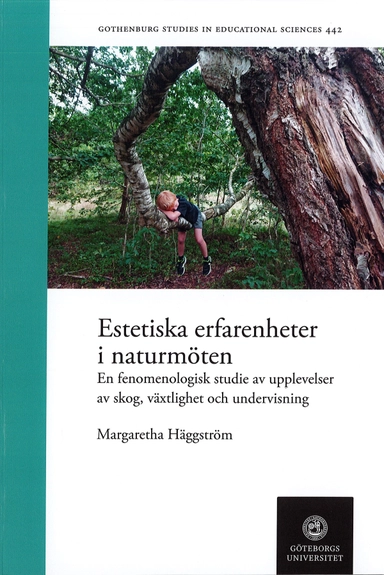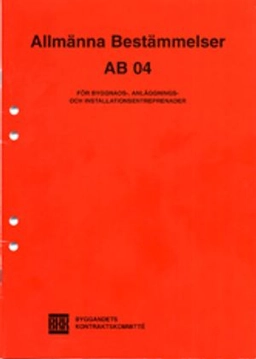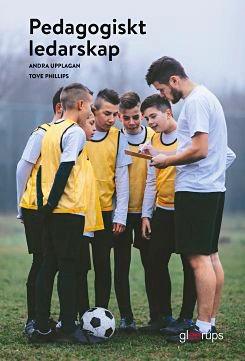In a period of accelerated environmental change, a focus on how humans build embodied relationships with the more-than-human world is a critical arena for pedagogical work. The aim of this thesis is to elucidate people’s lived experiences of being in the forest. The research is directed at aesthetic experiences, as sensuous experiences, of encounters with trees. The work is based on phenomenology and analyzed through hermeneutic phenomenology. This doctoral thesis is part of the research project Beyond Plant Blindness: Seeing the importance of plants for a sustainable world (The Swedish Research Council, dnr 2013-2014) and entails a two-part study; one part conducted with adults who have a habit of being-in-the forest and the other based in two primary school classes, using an outdoor pedagogy approach. The studies are presented through five articles. Article one frames an aesthetic and ethical perspective on art-based environmental education and sustainability and aims to link ethics, aesthetical environmental education and didactics with a phenomenological approach. In this way it serves as the theoretical background for the empirical work to come. Data for article two were collected using a questionnaire placed on a tree located in a specific forest setting over the course of a year. The results highlight the intersubjectivity and historicity of people's connections to a forest environment, and reveal that the experience of ‘being’ or ‘doing’ in a forest produces a larger, more nuanced, response than simply the experience in itself. Data for article three were collected using “walk and talk” interviews. Analysis reveals that (a) childhood experiences seem to play a crucial role in adult experiences of forests; (b) place-identity and sense of belonging are significant elements in how the participants define themselves; (c) being-in-the-forest is connected to an active, exploring and moving body, and that the connection with the more-than-human world of the case study forest is deeply anchored, as part of the human body. This relationship appears to be shaped through a process of constructing and reconstructing memories, practice and selfhood, and can, it seems, last a lifetime. Article three and five builds on action research with two teachers, who planned and designed a Storyline with the aim of giving their students opportunities to discover the intrinsic value of plants, by meeting with trees and slowly becoming trees. In a post-humanist sense, this approach rejects the notion of human as an ontological given, disembodied and separate from the kingdom of plants. Students de-homogenized plants by transforming themselves into trees, thus an inverted anthropomorphization was implemented. This second part of the thesis contributes new perspectives on the emerging relationship between young students and trees initiated through authentic meetings in which such relationships developed. Thus, the result can be used in didactical discussions on concrete, pedagogical and philosophical levels. In the long term, such relationships could have a positive impact on human connections to plants, the basis of much of life on Earth. Parts of work Artikel 1. Häggström, M. (2017). An Aesthetical and Ethical Perspective on Art-Based Environmental Education and Sustainability from a Phenomenological Viewpoint. I Franck, O.& Osbeck, C. (red.), Ethical Literacies and Education for Sustainable Development. Young People, Subjectivity and Democratic Participation, s. 85 - 103. London: Palgrave Macmillan. visa artikel Artikel 2. Häggström, M. (2019). Being-in-the forest – a matter of cultural connections with a natural environment. Plants, People, Planet, vol 1, nr 3, s.1-21. visa artikel Artikel 3. Häggström, M. (2019). Lived Experiences of Being-in-the-Forest as Relationships with the More-than-Human World. Environmental Education Research, s. 1-14. visa artikel Artikel 4. Häggström, M. (2019). Besjälning av träd som ett steg att förebygga växtblindhet hos grundskoleelever - En aktionsforskningsstudie av Storylinearbete i år 2 och 6. I E. Reimers, M. Harling, I. Henning Loeb och K. Rönnerman (red), Lärarprofession i en tid av förändringar. Konferensvolym från den tredje nationella ämneskonferensen i pedagogiskt arbete. Göteborgs universitet, s. 123-144. Artikel 5. Häggström, M. (2019). Students being transformed into trees: inverted anthropomorphization in order to enhance connectedness to natural environments and plants. I J. Reiss (red), Art, Theory and Practice in the Anthropocene. New York: Vernon Press, s. 137-153. https://gupea.ub.gu.se/handle/2077/60226
Åtkomstkoder och digitalt tilläggsmaterial garanteras inte med begagnade böcker





















